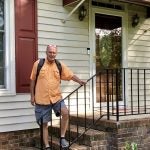VISITING CAMPUS
Spellings: Partnerships are ‘what it’s all about’
University of North Carolina President Margaret Spellings learned about East Carolina University’s work to promote innovation and economic development as she concluded her campus tour and meetings with students, faculty and others.
At the ECU Innovation Design Lab on Jarvis Street, Spellings saw the new MakerBot 3D printing lab and heard faculty innovators talk about their work to reduce sports injuries and improve adolescent health, explore the coast and help the military care for traumatically injured and brain-injured troops.
One word kept coming up.
“If I had a nickel for every time I’ve heard ‘partnership’ since I got through the door, I’d be rich,” Spellings said. “That’s what it’s all about.”
Among those partnerships is one with the life sciences sector in eastern North Carolina – particularly workforce development.
“In the past three months, we’ve brought 47 new people on board, of which 26 were from UNC-supported schools and, even better, eight were from ECU,” said Bill Weiser, global head of analytical sciences at Patheon, which has a factory in Greenville. “We’re growing. We’re looking for talent from entry-level through advanced degrees.”
Andrew Moghaddam, a 2014 ECU chemistry graduate and Analytical Chemist at Mayne Pharma in Greenville, said ECU’s work with life sciences companies helped him get a job after graduation.
“The relationships they’ve built up with these pharmaceutical companies was huge in me being able to find a job,” he said.
As psychology student Zack Evans, a senior, showed Spellings “augmented reality” technology he’s studying and developing that literally puts people in other places, she said, “That’s cool. What a great learning experience. Go ECU.”
Earlier, Spellings toured the Health Sciences Campus, hearing about education and research.
She noted the concerns she has heard across the state regarding the university system: affordability, accountability and access.
ECU leaders addressed those issues head-on. For example, Dr. Elizabeth Baxley, senior associate dean at the Brody School of Medicine, told Spellings that ECU medical graduates leave school with nearly $50,000 less debt than the national average. Because of that, graduates can choose primary care fields that pay less and are in higher demand than more lucrative specialty fields.
Provost Ron Mitchelson showed statistics indicating significant numbers of ECU students come from across North Carolina – not just from counties surrounding Greenville. And many of them are receiving need-based scholarships and learning through distance education. ECU leads the UNC system in the number of credit hours earned through distance education, Mitchelson said.
Sylvia Brown, dean of the College of Nursing, noted that ECU produces more baccalaureate nursing graduates – 587 alone in the most recent academic year – than any other UNC-system school. Ninety-eight percent of students pass their licensure exam on their first try, and slightly more than half remain in eastern North Carolina to practice.
On the fourth floor of the heart institute, scientists and doctoral students spoke with Spellings about their research and the collaborative nature of the labs there, where the East Carolina Diabetes and Obesity Institute is working with approximately $6 million in grant funding.
“You’re doing an experiment, and across the bench (someone says), ‘Oh, why don’t you do that?’” said Maria Torres, a fourth-year doctoral student in bioenergetics and exercise science. “That happens all the time.”
Drs. Carlos Anciano and Mark Bowling, lung specialists at the Brody School of Medicine, talked about image-guided interventions they use to diagnose lung cancer and remove malignancies. Nearly 500 North Carolinians die of lung cancer every month, Bowling said.
Using high-definition video of an actual procedure, Anciano showed how they remove tumors using tiny laparoscopic instruments. He then showed a follow-up procedure on the same patient.
“Now you’re just showing off,” Spellings quipped.
She also visited the School of Dental Medicine, where she participated in a remote presentation from community service learning centers in Elizabeth City and Spruce Pine.
Spellings also spoke about Chancellor Steve Ballard, who retires this summer.
“He leaves very big shoes to fill at a critical time in this institution and health care in America,” she said. She added that she’s confident of hiring a successor who will lead ECU for the next “10 to 15 years.”
Spellings, who assumed her role as leader of the state’s university system earlier this month, visited ECU as part of a listening tour of the 17 system campuses.
The focuses of Spellings’ visit to ECU were health care access and student success. She also met with faculty and students and toured the Pirate Academic Success Center. Her visit concluded with meetings with administrators, community leaders and a representative of the Board of Trustees.
Before her appointment as UNC system president, Spellings served as the U.S. Secretary of Education and White House domestic policy advisor under President George W. Bush.
Following her work with the Bush administration, Spellings worked with the U.S. Chamber of Commerce and served on the Bill and Melinda Gates Foundation Education Advisory Board.
In 2013, she was named president of the George W. Bush Presidential Center, where she launched the Presidential Leadership Scholars program, a one-of-a-kind leadership program borne out of the first-ever partnership of multiple presidential centers.
Spellings has said she sees her tenure as president of the UNC system as a chance to speak on behalf of public education in the broadest sense.










